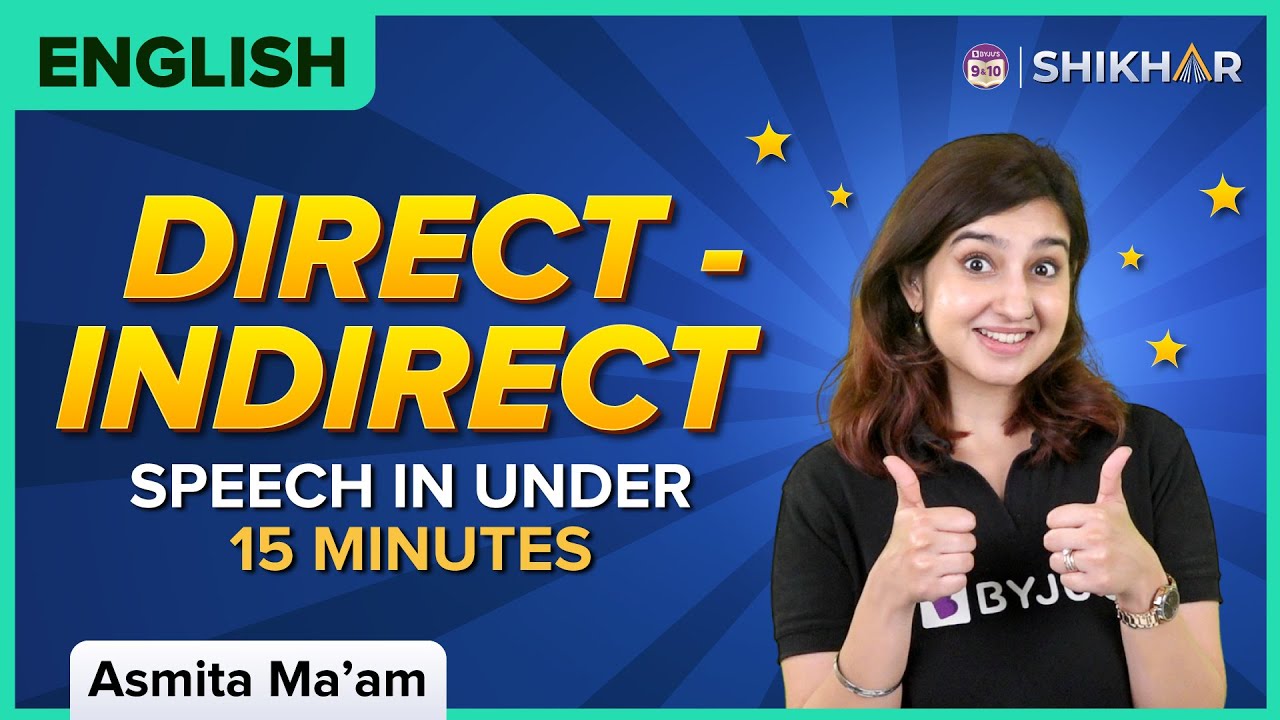BAHASA INGGRIS SMA - Reported Speech (Indirect & Direct Speech) | GIA Academy
Summary
TLDRThis video tutorial provides a comprehensive guide on converting direct speech into indirect (reported) speech. It explains the differences between direct and indirect speech, highlighting key changes such as tense adjustments, pronoun shifts, and time reference modifications. The video includes detailed examples of statements, questions, commands, and prohibitions transformed into indirect speech. Through clear instructions and exercises, viewers learn how to accurately report what others say while adhering to grammatical rules. Ideal for language learners, this tutorial simplifies the process of mastering reported speech in both English and Indonesian.
Takeaways
- 😀 Direct speech quotes the exact words spoken, while indirect speech rephrases or reports what was said.
- 😀 Indirect speech allows for the transformation of direct statements, questions, commands, and prohibitions into reported form.
- 😀 To change direct speech into indirect speech, we often remove quotation marks and add conjunctions like 'that', 'if', or 'whether'.
- 😀 Pronouns in direct speech must be adjusted when converting to indirect speech, changing from first-person (I) to third-person (he, she).
- 😀 Tenses change when converting from direct to indirect speech, especially when the reporting verb is in past tense.
- 😀 Time references also need modification in indirect speech, such as changing 'now' to 'then' or 'today' to 'that day'.
- 😀 Direct speech uses exact wording, while indirect speech rephrases it, often adjusting both pronouns and verb tenses.
- 😀 Reported speech can be used in writing, especially in articles and news, to convey someone else's message more clearly and completely.
- 😀 When converting commands into indirect speech, verbs are usually changed, adding 'to' before the verb, as in 'asked to' or 'told to'.
- 😀 WH questions in direct speech change into indirect speech by using 'if' or 'whether' and adjusting tenses and pronouns appropriately.
Q & A
What is direct speech?
-Direct speech involves quoting the exact words spoken by someone. The quoted words are placed in quotation marks, and there are no changes to the words used.
How does indirect speech differ from direct speech?
-Indirect speech involves reporting what someone said, but not quoting their exact words. The words are rephrased and may involve changes in pronouns, tenses, and time references.
What are the key steps to convert direct speech to indirect speech?
-To convert direct speech to indirect speech, you must remove quotation marks, use conjunctions like 'that,' 'if,' or 'whether,' change pronouns, adjust tenses, and modify time references.
Can you provide an example of converting a statement from direct speech to indirect speech?
-Direct: 'Dina says, 'I like avocado juice.'' Indirect: 'Dina said that she liked avocado juice.'
What changes occur in pronouns when converting direct speech to indirect speech?
-Pronouns in direct speech usually change to reflect the perspective of the reporting sentence. For example, 'I' in direct speech may change to 'she' or 'he' in indirect speech.
How do tenses change when converting direct speech to indirect speech?
-The tense in indirect speech generally shifts one step back. For example, present simple tense becomes past simple, present continuous becomes past continuous, and present perfect becomes past perfect.
What is the role of conjunctions like 'that,' 'if,' or 'whether' in indirect speech?
-Conjunctions like 'that,' 'if,' and 'whether' are used to connect the reporting verb with the reported speech. 'That' is used for statements, while 'if' and 'whether' are used for yes/no questions.
How do time references change when converting direct speech to indirect speech?
-Time references in direct speech change to match the time frame of the reporting sentence. For example, 'now' becomes 'then,' 'today' becomes 'that day,' 'yesterday' becomes 'the day before,' etc.
Can you give an example of how to convert a yes/no question from direct speech to indirect speech?
-Direct: 'Doni asks, 'Did you enjoy your holiday?'' Indirect: 'He wanted to know if she had enjoyed her holiday.'
What happens to the verb tense in indirect speech for a command or request?
-For a command or request, the verb in indirect speech is usually changed to an infinitive form, and the reporting verb might include words like 'asked,' 'requested,' or 'told.'
Outlines

This section is available to paid users only. Please upgrade to access this part.
Upgrade NowMindmap

This section is available to paid users only. Please upgrade to access this part.
Upgrade NowKeywords

This section is available to paid users only. Please upgrade to access this part.
Upgrade NowHighlights

This section is available to paid users only. Please upgrade to access this part.
Upgrade NowTranscripts

This section is available to paid users only. Please upgrade to access this part.
Upgrade NowBrowse More Related Video

REPORTED SPEECH - PENGGUNAAN DIRECT AND INDIRECT SPEECH - RUMUS DAN CONTOH

Direct - Indirect (Reported) Speech in Under 15 Minutes | Class 9 and 10 | English | BYJU'S

BELAJAR DIRECT AND INDIRECT SPEECH (REPORTED SPEECH)

Direct Indirect Speech / Kalimat Langsung dan Kalimat Tidak Langsung

Can you use REPORTED SPEECH? Grammar Lesson + Examples

Learn English Grammar: DIRECT & INDIRECT SPEECH (REPORTED SPEECH)
5.0 / 5 (0 votes)